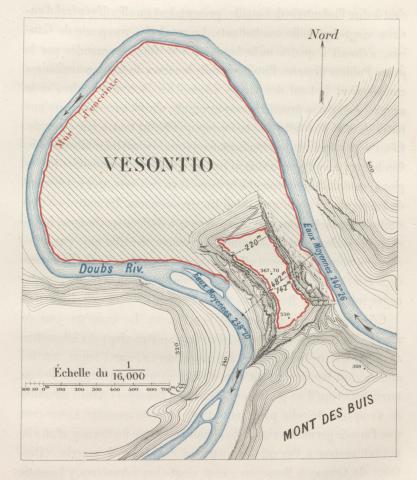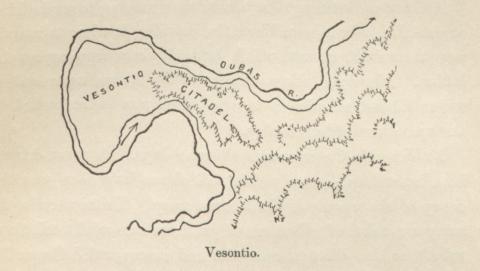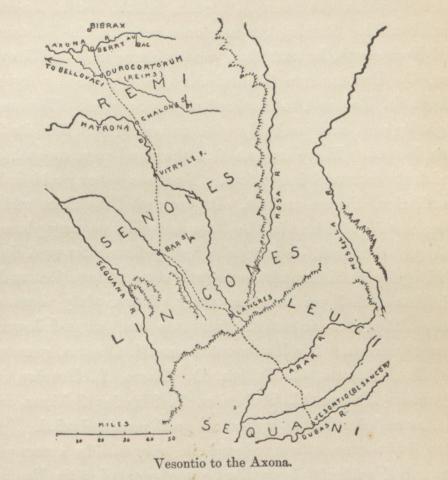trīduum, -ī n.: period of three days, three days.
nūntiō, -āre, -āvī, -ātus: bring news; announce, report, relate; command.
Ariovistus, -ī, m.: Ariovistus, a German chief, or king.
Vesontiō, -ōnis, m.: Vesontio, the principal town of the Sequani, now Besançon.
Sēquanī, -ōrum m.: the Sequani, a tribe of eastern Gaul, west of the Jura Mountains
contendō, -tendere, -tendī, -tentus: strain, exert oneself; strive for, attempt, try; hasten, press forward; contend, vie; join battle, fight, quarrel; insist; demand.
magnopere: adv., very much, greatly; earnestly, urgently; particularly.
praecaveō, -cavēre, -cāvī, -cautus: take care before-hand.
namque: conj., for indeed, for, and in fact.
facultās, -ātis f.: ability, power; opportunity, chance, occasion, leave; supply, abundance; pl., resources.
mūniō, -īre, -īvī, -ītus: fortify, strengthen; protect, secure, guard; build, iter mūnīre, construct a road; mūnītus, -a, -um, fortified, protected, safe; (sup.) mūnītissimus, -a, -um, strongly fortified.
facultās, -ātis f.: ability, power; opportunity, chance, occasion, leave; supply, abundance; pl., resources.
proptereā: adv., therefore, on that account; proptereā quod, for the reason that, because.
quod: conj., that, in that, because, since; as to the fact that: the fact that.
Dubis, -is, m.: the Dubis, a river of Gaul flowing into the Arar (Saône), now the Doubs.
circinus, -ī, m.: pair of compasses.
circumdūcō, -dūcere, -dūxī, -ductus: lead around; draw around, trace.
sescentī, -ae, -a (dc): pl. adj., six hundred.
intermittō, -mittere, -mīsī, -missus: let go between, leave between; omit, stop, leave, leave off; leave vacant; allow to intervene; neglect; interrupt, separate; intermissō spatiō, at a distance, after an interval.
altitūdō, -dinis f.: height, altitude; depth; thickness; in altitūdinem, in height (depth).
rādīx, -īcis, f.: root; lower part, base; pl., foot of a hill or mountain.
circumdō, -dare, -dedī, -datus: put around; surround, encompass.
coniungō, -iungere, -iūnxī, -iūnctus: join together, unite; connect, fasten together; sē coniungere, unite; part., closely joined, allied, associated, connected, having relationship.
nocturnus, -a, -um: of night, nocturnal, night; during the night.
diurnus, -a, -um: pertaining to the day, by day.
contendō, -tendere, -tendī, -tentus: strain, exert oneself; strive for, attempt, try; hasten, press forward; contend, vie; join battle, fight, quarrel; insist; demand.
conlocō, -āre, -āvī, -ātus: place, station, establish, put; place permanently, settle; give in marriage.



